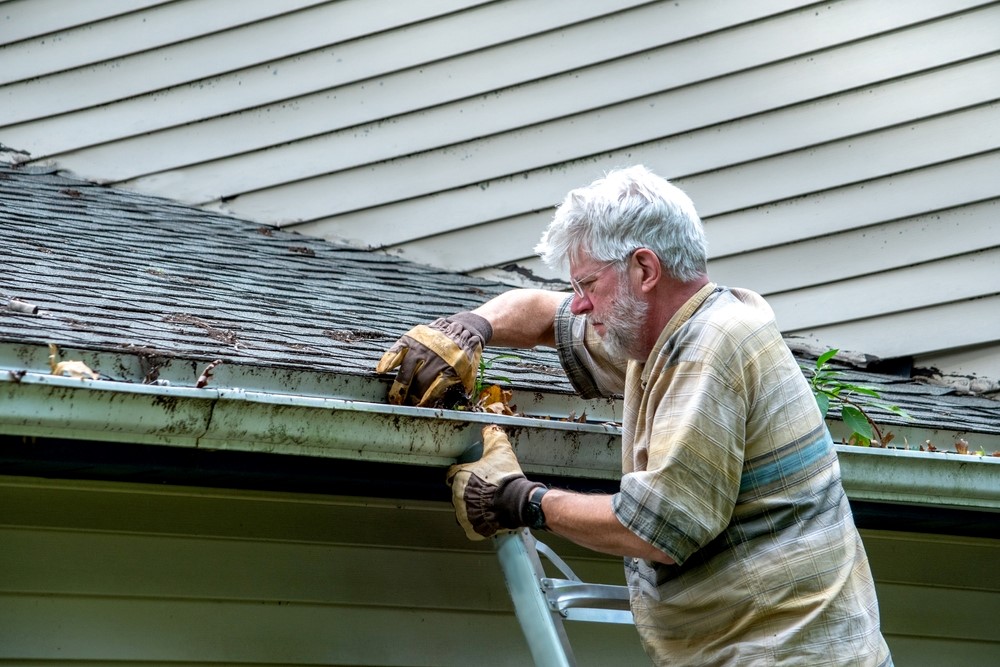
Many seniors become increasingly more dependent with age. Not all of them though. Some take the opposite approach, where they remain fiercely independent, perhaps to the extent of putting themselves at risk.
While such independence is often a good thing, it can seem scary too. What’s the response if your aging father does too much?
Many adult children worry in this situation , convinced that there may soon be a serious accident.
What if your 70-year-old father is still climbing ladders to clean the gutters? Or your 80-year-old mother cooks elaborate meals and has guests over regularly.
How do you convince them to slow down? To take care of themselves before doing too much causes serious harm?
This question comes up in various forms on many aging care forums. It’s even submitted to experts, so it’s clearly a serious one.
Should You Step In?
Most adult children interested in this topic ask how to get their aging parent to do less. What are the best things to say? The right arguments? Are there any other ways to convince them?
But, this isn’t the best place to begin.
We first need to talk about whether you should get your aging parent to do less.
You’re worried, perhaps rightfully so. Your loved one might even be ignoring doctor’s advice and doing things that they’re not meant to do. There may have even been minor accidents, like a burn or a cut, or perhaps something more serious.
Here’s the thing… doctor’s advice is just that – advice.
Few of us do everything our doctor says we should. After all, if you only ever did what was good for your health, life would be pretty dull.
Instead, we pick and choose. We follow some pieces of advice and not others. Why should things be any different for your aging parents?
Your Parents Are Adults
The right to decide for ourselves doesn’t disappear as we age.
Seniors have a lifetime of making their own decisions. And, unless they’re considered mentally incompetent, they still get to decide what their lives look like.
This includes making ‘bad’ decisions.
We’ve all made those, right? Like going to a shady tattoo artist to save a bit of money or not researching a purchase before we make it.
Bad decisions are a part of life.
So, your father has the right to be as active as he wants. He’s probably well aware of the risks anyway. He may have just chosen that staying active and engaged is a high priority for him.
Keeping Active Can Be Important
If your aging mother or father is doing too much, what’s the alternative?
Perhaps you want them to slow down.
What does that look like, though?
Many aging parents have lived full lives. They may have held down full-time jobs, raised children, gone on trips, taken care of the house, had their hobbies, made friends, and done many other things.
These areas are all part of the tapestry of a person’s life.
They’re where we find hope, excitement, and meaning.
Growing older changes the tapestry. Most seniors no longer have work to fill their days. Their children have grown too and now have lives of their own.
Retirement brings with it much more free time. While this seems like a blessing at first, that time still needs to be filled.
Slowing down and just doing quiet activities day after day feels completely different.
Many people still want meaning in their lives.
For an aging father, doing projects around the home may be a part of this.
If what he’s doing makes him happy and he’s willing to risk hurting himself, well, that’s ultimately his call. You just need to decide how you’re going to respond. Are you going to constantly nag him or is it time to learn to step back a little?
What You Can Do

So, trying to force your aging father to slow down isn’t fair.
It’s probably not realistic either. If you’ve got to the point of researching solutions, then most of the obvious approaches probably aren’t working at all.
Do you resign yourself to the situation at hand?
Perhaps.
Or, you could come at it from a different perspective.
Rather than trying to convince your aging father to slow down, why not talk to him about how to be safer?
For example, if you’re worried about him cleaning the gutters – start there. Tell him about your concerns. Say that you don’t want to hold him back, but you want to make things safer.
It may help to brainstorm with him. Try to figure out, together, how you can make the task safer. This might include making sure someone else is there or investing in a better ladder.
Some seniors may be resistant. They might think the risk of an accident is low or that they’re too good to get seriously hurt.
If this is the case, try shifting the perspective.
You might say that you worry, that you can’t help it. That it would make you feel better if there’s a way to make him a little safer.
Trying To Change Them Can Backfire
Here’s another thing. Constantly badgering your aging parent to slow down or not do specific things could easily backfire.
For one thing, you risk harming your relationship with them. After all, who wants to be around someone who is always complaining?
There’s also the risk that they agree with your suggestions to get you to step down, then go behind your back and do something different. Like, an aging father saying that he won’t mow the lawn himself, then does it anyway once you’ve left for the day.
Some seniors might even take more risks in an effort to prove their independence.
Plus, a senior who feels constantly berated isn’t likely to come to you when there is a problem. But, if you focus on respect and kindness, they’ll be more open to talking to you and looking for solutions.
Lean Into Interdependence
The loss of independence is one of the biggest fears that comes with aging.
This isn’t surprising, as aging often decreases what seniors can do on their own.
A good alternative is the idea of interdependence. This highlights the fact that people rely on one another. That we all need other people to do well.
There’s been growing interest in interdependence as a way to help seniors. The approach often lessens their resistance to receiving help, while also gives them a sense of purpose, as they are helping others at the same time.
This may be something you can work on with your parents. You might talk to them about the idea that needing help in some areas doesn’t mean they’re ‘losing it’. It’s simply a natural part of being human.
Perhaps you can work with them in figuring out ways of shifting things around, so that you do some tasks around the home, while they help you in other areas. Doing this would help to keep them safe, without forcing them to slow down too much.
Are There Signs Of Cognitive Decline?
There’s one other thing to think about – cognitive decline.
A senior putting themselves at risk could be experiencing cognitive issues, perhaps even the early symptoms of dementia. If this seems likely, or even possible, then it’s important to talk to the senior’s doctor and see about an assessment.
A good indication is whether the concerning behavior is new.
If your father has always been active and likes having a project, then not wanting to slow down isn’t surprising at all (it might be more surprising he did want to slow down).
Also, it’s worth being gentle when bringing this topic up with an aging family member. It’s easy to end up offending them, which could harm your relationship.
Final Thoughts
When it comes to aging parents, respect is an excellent bottom line.
Despite how it may feel, supporting an aging father or mother isn’t a role reversal. Specifically, they’re not your child.
Your aging parents are still adults. They have a lifetime of decision making and independence under their belts. Many still have their cognitive facilities intact and are certainly able to make decisions about their lives.
You may not agree with all the decisions they make.
But, they wouldn’t agree with all of yours either.
Feeling Overwhelmed?
Check out our Caregiving Consulting service for personalized support and guidance.

Leave a Reply